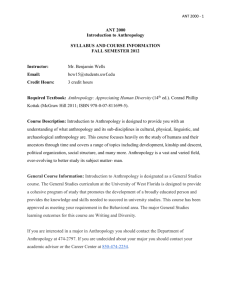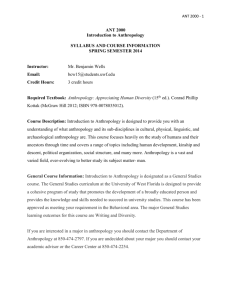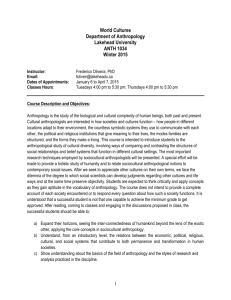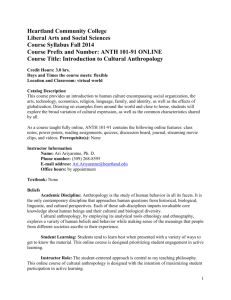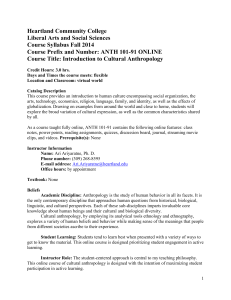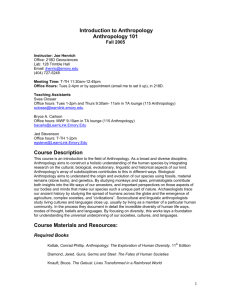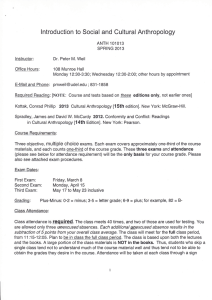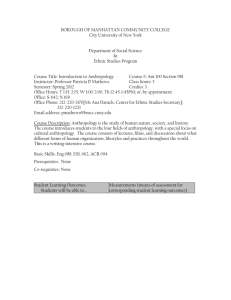ANTH102-01 ARI FA14 - Heartland Community College
advertisement
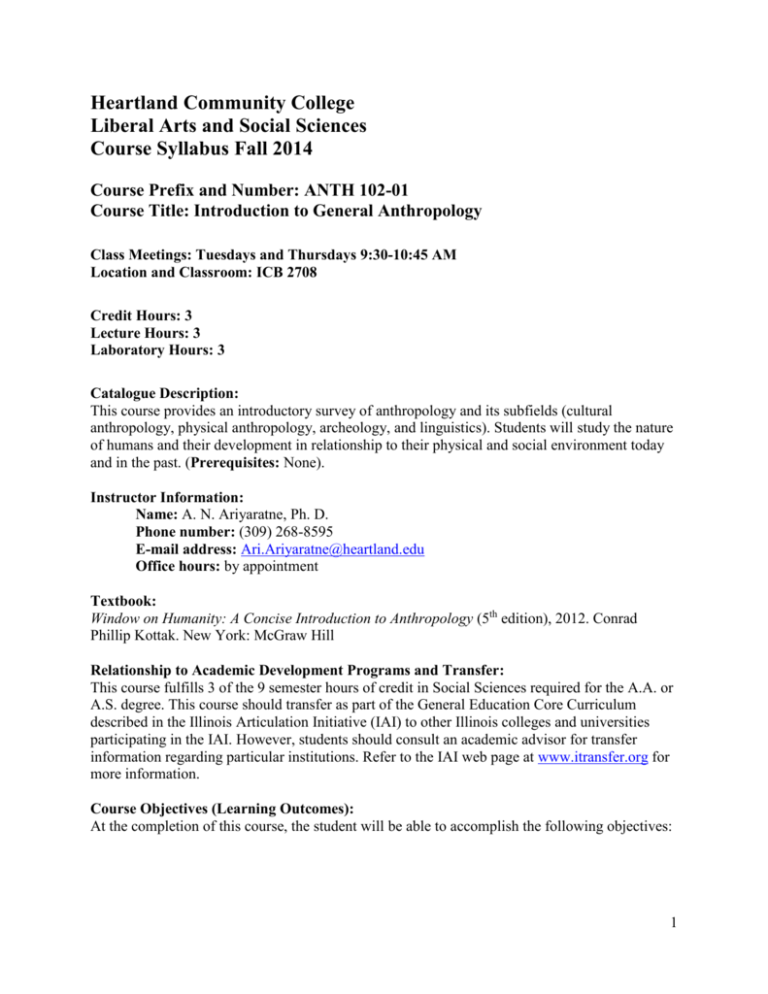
Heartland Community College Liberal Arts and Social Sciences Course Syllabus Fall 2014 Course Prefix and Number: ANTH 102-01 Course Title: Introduction to General Anthropology Class Meetings: Tuesdays and Thursdays 9:30-10:45 AM Location and Classroom: ICB 2708 Credit Hours: 3 Lecture Hours: 3 Laboratory Hours: 3 Catalogue Description: This course provides an introductory survey of anthropology and its subfields (cultural anthropology, physical anthropology, archeology, and linguistics). Students will study the nature of humans and their development in relationship to their physical and social environment today and in the past. (Prerequisites: None). Instructor Information: Name: A. N. Ariyaratne, Ph. D. Phone number: (309) 268-8595 E-mail address: Ari.Ariyaratne@heartland.edu Office hours: by appointment Textbook: Window on Humanity: A Concise Introduction to Anthropology (5th edition), 2012. Conrad Phillip Kottak. New York: McGraw Hill Relationship to Academic Development Programs and Transfer: This course fulfills 3 of the 9 semester hours of credit in Social Sciences required for the A.A. or A.S. degree. This course should transfer as part of the General Education Core Curriculum described in the Illinois Articulation Initiative (IAI) to other Illinois colleges and universities participating in the IAI. However, students should consult an academic advisor for transfer information regarding particular institutions. Refer to the IAI web page at www.itransfer.org for more information. Course Objectives (Learning Outcomes): At the completion of this course, the student will be able to accomplish the following objectives: 1 Course Outcomes Define central concepts of general anthropology and apply them to help understand the human condition. Develop a broader understanding of fellow human beings and an appreciation for human biocultural origin, evolution, and diversity. Utilize the holistic and comparative perspectives of anthropology to approach human questions from archeological, physical/biological, cultural/social, linguistic, and applied anthropological perspectives. Use the vast repertoire of ethnographic, linguistic, physical, archeological, and applied anthropological field data and research evidence, explore, discuss, and appreciate humankind, in all its facets and variety in space and time. Reflect upon the formation of their interests, talents, and goals. Develop and nurture distinctive skills that can be used for the processes of learning, problem solving. Essential Range of Assessment Methods Competencies CT1 CT2 DL2 DL4 DL5 D11 DL4 CT1 CO1 DL4 DL5 PS1 PS2 CT1 CT3 D13 PS3 CO6 DL4 PS2 PS3 PS4 CT1 Writing Assignments, Quizzes, Exams, Projects, Presentations, Discussions. Writing Assignments, Quizzes, Exams, Projects, Presentations, Discussions. Writing Assignments, Quizzes, Exams, Projects, Presentations, Discussions. Writing Assignments, Quizzes, Exams, Projects, Presentations, Discussions. Writing Assignments, Quizzes, Exams, Projects, Presentations, Discussions Writing Assignments, Quizzes, Exams, Projects, Presentations, Discussions 2 Course Outline: I. Introducing Anthropology: Holistic Approach, Comparative Method, and Five Main Sub-disciplines II. Biological or Physical Anthropology: Concepts, Approaches, and Methods III. Human Biology, Evolution, Biological Diversity, and Adaptation IV. Primate Evolution, Emergence of Homo and Homo sapiens V. Archeological Anthropology or Archeology: Concepts, Approaches, and Methods VI. Studying Past: Origins of Food Production, State Formation, and Rise of Civilization VII. Linguistic Anthropology or Linguistics: Concepts, Approaches, and Methods VIII. Cultural Anthropology: Concepts, Approaches, and Methods IX. Making a Living: Subsistence and Economy X. Cultural Construction of Identity: Kinship, Descent, and Marriage XI. Political Anthropology XII. Globalization XIII. Applied or Practicing Anthropology: Concepts, Approaches, and Methods Method of Instruction: Course outline given here corresponds to the Content Modules given in Heartland Community College’s Blackboard course webpage for ANTH 102-01. There are fourteen (14) content modules. The students are required to visit the webpage regularly throughout the semester to browse the relevant unit(s), and complete the required on-line quizzes (See the course calendar in your course webpage for further details). Since this is an introductory course using only supplemental level of on-line resources, there will be a fair amount of in-class instruction. Efforts will be made to encourage students to raise relevant questions and to initiate class discussion. Discussion will be interspersed throughout sessions rather than, as it is typically done, merely at the end of the session. In addition to lecture and discussion, I will use question and answer format, visual aids (e. g. PowerPoint presentations, ethnographic videos, and appropriate movie clips). Method of Evaluation (Tests/Exams, and Grading System): Letter grades will be based on the percentage of points earned in the course in accordance with the following scale: A- 90-100% B- 80- 89% C- 70- 79% D- 60- 69% F- 59- 0% You will be evaluated using the following method: Quizzes or Multiple-choice Questions: 1 points x 14 modules = 14 In-class Activities: 6 points In-class Examinations: 20 x 4 = 80 Total Number of Points Available: 100 3 When referring to letter grades, definitions, and grade point equivalent, this course follows the guidelines of HCC official grading system given under the HCC Academic Policies of the 2014 HCC Catalog. Incompletes: Incompletes are allowed only under the most extreme situations. Students wishing to earn an incomplete grade should see the instructor. Extra Credit: Extra credit works are allowed only under extreme situations. Deadlines/Late Work: Make-up Tests and Assignments: Students may make up exams ONLY under the following conditions: 1. The student informs the instructor that s/he will miss an exam BEFORE exam day begins. 2. The instructor decides if the reason/excuse WARRENTS a make-up exam. There are no make-ups for work done in class. Attendance/Participation: 1. Regular attendance and class participation are vital to ensure a good grade, and it is your responsibility to be here in both body and mind. 2. You are responsible for all materials presented and discussed in class if you are absent. Midterm Withdrawal Policy: Students are expected to attend all classes and meaningfully participate each day. Any student who does not make reasonable attempts to successfully complete all course activities (exams, homework, quizzes, etc.), may be withdrawn from the course at midterm. However, if any of the following situations apply, the student will be automatically withdrawn by the end of week 8: was absent for any 2 consecutive weeks without appropriate notice has more than 5 unexcused absences Did not complete at least 60% of assignments Student Conduct/Class Rules: 1. Turn off all cell phones and pagers before class starts. 2. Do not interrupt other students while they are making a point or asking a question. 3. Do not attempt to carry on a conversation with another student while in class. 4. Be on time for class and stay the whole period. If you need to come late or leave early please let the instructor know ahead of time. 4 Student Evaluations: Towards the end of the semester, all students are expected to complete a course evaluation in class. Academic Integrity: Academic integrity is a fundamental principle of collegial life at Heartland Community College and is essential to the credibility of the College’s educational programs. Moreover, because grading may be competitive, students who misrepresent their academic work violate the right of their fellow students. The College, therefore, views any act of academic dishonest as a serious offense requiring disciplinary measures, including course failure, suspension, and even expulsion from the College. In addition, an act of academic dishonesty may have unforeseen effects far beyond any officially imposed penalties. Violations of academic integrity include, but are not limited to cheating, aiding or suborning cheating or other acts of academic dishonesty, plagiarism, misrepresentation of data, falsification of academic records or documents and unauthorized access to computerized academic or administrative records or systems. Definitions of these violations may be found in the college catalog. Plagiarism: Plagiarism is the presenting of others’ ideas as if they were your own. When you write a paper, create a project, do a presentation or create anything original, it is assumed that all the work, except for that which is attributed to another author or creator, is your own. Plagiarism is considered a serious academic offense and may take the following forms: Copying word-for-word from another source and not giving that source credit. Paraphrasing the work of another and not giving that source credit. Adopting a particularly apt phrase as your own. Using an image or a copy of an image without crediting its source. Paraphrasing someone else’s line of thinking in the development of a topic as if it were your own. Using another person’s project or another person’s work as if it were your own. [Adapted from the Modem Language Association’s MLA Handbook for Writers of Research Papers. 7th ed. New York: MLA, 2009:51-61] Note that word-for-word copying is not the only form of plagiarism. The penalties for plagiarism may be severe, ranging from failure on the particular piece of work, failure in the course or expulsion from school in extreme cases. Many plagiarism problems can be remedied by citing the sources of the original work. When in doubt, cite the source according to the style your instructor directs. Usually this is APA or MLA Style. Don’t be daunted by citing sources which are not books. You can cite everything, including pamphlets, maps, cereal boxes, telephone conversations, movies, television shows, Internet and world-wide web sites. 5 General Information for Students: Testing Services (located in Student Commons Building 2001): Testing Services provides a secure testing environment for students who are enrolled in online, hybrid, and other distance learning courses; have a documented disability; or need to take a make-up exam. Testing accommodations for students having documented disabilities must be arranged by the student through Disability Support Services. Testing Services will only administer exams at the request of the instructor. For more information, please call (309) 2688050. Counseling Services: Counseling Services provides confidential and professional counseling for both emergency and personal issues. Services also include referrals to local community resources and support for students on academic probation. For more information, please call (309) 268-8318. Services in Academic Support Center (Raab Road campus): Library: The Library provides fast and free access to credible information from a full range of resources including books, online journals, videos, newspapers, online music, class reserves, and interlibrary loan. Individualize research by appointment or come in anytime. See the Library tab in myHeartland, email library@heartland.edu or call (309) 268-8292 for details. Tutoring Services: Tutoring Services provides tutoring in various forms at no cost to Heartland students in Normal, Pontiac, and Lincoln. Tutors are available at convenient times throughout the week. Study groups are also available by request. For more information about services available at each location, please call (309) 268-8231 (Normal), (815) 842-6777 (Pontiac), or (217) 735-1731 (Lincoln). Disability Support Services: Disability Support Services (DSS) ensures that students with disabilities have equal access to the college’s programs, services and activities through the provision of reasonable accommodations as mandated in Section 504 of the Rehabilitation Act and the Americans with Disabilities Act. DSS offers a wide range of services to support students with disabilities, including: assistive technology, document conversion services, personnel, classroom and testing accommodations. Students with a documented disability who wish to discuss academic accommodations should call (309) 268-8259 for details. Open Computing Lab: The Open Computing Lab provides free computing for HCC students at convenient times throughout the week. The computer lab is staffed by trained Lab Assistants and offers the use of approximately 70 computers, a scanner, a laser printer, and an electric typewriter. Writing Lab: The Writing Lab provides guidance for writers on assignment comprehension, critical thinking and the stages of the writing process. The Writing Lab is staffed by English faculty and Tutors with years of experience working with students on writing. In every session, supportive staff 6 work with writers to explore and develop their own ideas as appropriate to the needs of their readers and to learn the rhetorical strategies necessary for effective communication. For more information, please call (309) 268-8231. Services in Community Commons Building, first floor (Raab Road campus): Academic Advising: Academic advisors help students develop a plan of study, review degree/program requirements, discuss transferability of courses, and provide career exploration support. For more information, please call (309) 268-8033. Academic Advising services are also available at the Lincoln and Pontiac sites. Career Services: Career Services assist students to determine career goals, develop employability and job search skills and connect with potential employers in preparation for employment and career transitions. Through the Online Career Center at www.collegecentral.com/heartland students can learn about area employment opportunities, prepare and post resumes and find a host of free career-related resources. The job shadow and internship programs offer access to relevant workbased learning opportunities that enhance academic experiences and support students in their career pursuits. For more information, please call (309) 268-8034 or email Career.Services@heartland.edu. Financial Aid Office: The Financial Aid Office provides information on programs and types of financial aid available to students. For more information, please call (309) 268-8020. Transcripts (Located in Student Commons Building 1000): Official and unofficial transcripts may be obtained in the Student Records Office. Transcripts may also be obtained at Heartland’s Lincoln and Pontiac sites. Official transcripts must be requested in writing. The form is available online (http://www.heartland.edu/transcripts/index.jsp) or in the Student Records Office. Unofficial transcripts are available to print online through IRIS. Syllabi Disclaimer: The instructor reserves the right to make alterations to this syllabus as necessary. Course Calendar: Week 1 (August 19 and 21) Introduction and Perspective: Holistic Approach and Five Main Sub-disciplines Required Readings: Kottak, Chapter 1 Week 2 (August 26, August 28) Biological or Physical Anthropology: Concepts, Approaches, and Methods Required Readings: Kottak, Chapters 1 (p. 10) and 3 (Pp. 47-50) 7 Week 3 (September 2 and 4) Human Biology, Evolution, Biological Diversity, and Adaptation Required Readings: Kottak, Chapter 4 Week 4 (September 9 and 11) Primate Evolution: Emergence of Homo and Homo sapiens Required Readings: Kottak, Chapters 5, 6, and 7 Week 5 (September 16 and 18) Archeological Anthropology or Archeology: Concepts, Approaches, and Methods Required Readings: Kottak, Chapters 1 (Pp. 7-10), and 3 (Pp. 41-46) September 16 – Examination -1 (In Class) Week 6 (September 23 and 25) Studying Past: Origins of Food Production, State Formation, and Rise of Civilizations Required Readings: Kottak, Chapters 8 and 9 Week 7 (September 30 and October 2) Linguistic Anthropology or Linguistics: Concepts, Approaches, and Methods Required Readings: Kottak, Chapters 1 (p. 11), and 10 Week 8 (October 7 and 9) Linguistic Anthropology or Linguistics: Concepts, Approaches, and Methods (continuation) Required Readings: Kottak, Chapter 10 Week 9 (October 14 and 16) Cultural or Socio-cultural Anthropology: Concepts, Approaches, and Methods Required Reading: Kottak, Chapters 1 (Pp. 7), and 2. October 14 – Examination -2 (In Class) Week 10 (October 21 and 23) Making a Living: Subsistence and Economy Required Reading: Kottak, Chapter 11 Week 11 (October 28 and 30) 8 Cultural Construction of Social Identity: Kinship, Descent, and Marriage Required Readings: Kottak, Chapter 13 Week 12 (November 4 and 6) Political Anthropology Required Readings: Kottak, Chapter 12 Week 13 (November 11 and 13) Modernity and Globalization Required Reading: Kottak, Chapter 16 November 11 – Examination -3 (In Class) Week 14 (November 18 and 20) Modernity and Globalization (Continuation) Required Reading: Kottak, Chapter 19 Week 15 (November 25) Applied or Practicing Anthropology: Concepts, Approaches, and Methods Required Readings: Kottak, Chapters 1 (Pp. 12-13), and 18 Week 15 - November 27 – 28 – Thanksgiving Break – College Closed Week 16 (December 2 and 4) Applied or Practicing Anthropology: Concepts, Approaches, and Methods (Continuation) Required Readings: Kottak, Chapters 1 (Pp. 12-13), and 18 Week 17 - December 9 –Examination – 4 (in class) 9
